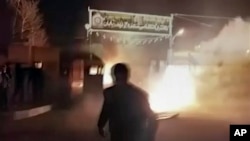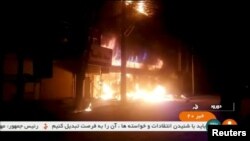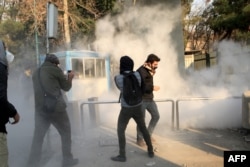U.S. President Donald Trump praised Iranian protesters Tuesday, saying they were "finally acting against the brutal and corrupt" regime in Tehran, even as Iran's supreme leader accused the government's enemies of stirring the violent anti-government demonstrations.
Trump contended in a Twitter comment that "all of the money" that his predecessor, former President Barack Obama, "so foolishly gave" Iran as part of a 2015 international agreement to control Iran's nuclear weapons development program "went into terrorism and into their 'pockets.' The people have little food, big inflation and no human rights. The U.S. is watching!"
"The Iranian people are expressing frustration, frustration about a regime that pays more attention to exporting terrorism than it does of meeting the needs of its own people," said National Security Adviser H.R. McMaster in an interview Tuesday with VOA Contributor Greta Van Susteren.
McMaster told Van Susteren that the Iranian government has to be held accountable for its actions.
"It's important that this regime be denied the resources it needs to continue its murderous campaigns, and so it's diplomacy, but it's also sanctions, and we see the Iranian people are expressing their displeasure about the nature of this regime how it treats them, but also how it treats the rest of the world," McMaster said.
Nikki Haley, the U.S. ambassador to the United Nations, said the United States would seek to call an emergency session of the U.N. Security Council to discuss the Iranian protests, which have claimed at least 21 lives in the last six days.
"The people of Iran are crying out for freedom," Haley said.
White House spokeswoman Sarah Huckabee Sanders on Tuesday called the protests an "organic popular uprising organized by brave Iranian citizens."
She said, "The United States supports the Iranian people and we call on the regime to respect its citizens' basic right to peacefully express their desire for change."
U.N. Secretary-General Antonio Guterres expressed his "regret" at the bloodshed in Iran, saying the U.N. expects "the rights to peaceful assembly and expression of the Iranian people will be respected."
Meanwhile, the U.S. State Department urged Iran to stop blocking online social media traffic in the country and said its citizens could set up virtual private networks to circumvent censorship. Since the protests erupted last week, Iran has curbed some social media services like Instagram and Telegram.
Iran's response
After Trump's comments, the Iranian Foreign Ministry said, "Instead of wasting his time sending useless and insulting tweets regarding other countries, he would be better off seeing to the domestic issues of his own country, such as daily killings of dozens of people ... and the existence of millions of homeless and hungry people."
Earlier, Ayatollah Ali Khamenei said, in a statement shown on state television, "In recent days, enemies of Iran used different tools, including cash, weapons, politics and intelligence apparatus to create troubles for the Islamic Republic." Khamenei said he would address the nation about the anti-government protests "when the time is right."
Ali Shamkhani, secretary of the Supreme National Security Council, accused the United States, Britain and Saudi Arabia of fomenting the protests.
"Saudis will receive Iran's unexpected response and they know how serious it can be," Shamkhani said in a television interview.
Nine more people were killed overnight in the protests over economic conditions and Iran's military ventures in Syria, Iraq and Yemen. The government said six people were killed at a police station in the town of Qahdarijan in clashes that began as rioters tried to steal guns.
In Najafabad, state media said a police officer was killed.
Iran's president, Hassan Rouhani, vowed Monday that security forces would "respond to rioters and lawbreakers."
"The government will show no tolerance for those who damage public properties, violate public order and create unrest in the society," he said.
Fueling protests
Hundreds of demonstrators have been arrested since the protests began Thursday in Mashhad before spreading to other parts of the country. Deputy Interior Miniaster Hossein Zolfaghari said 90 percent of those detained were under 25 years old, an indication of their frustration at lack of social freedoms and economic conditions in the country, including high unemployment and rising food prices.
Hussein Banai, an assistant professor at Indiana University, told VOA that economic hardship and uneven wealth distribution have been a part of Iran since its 1979 revolution, but that now there are extra factors helping drive the protests.
"What is different this time around is the conspicuous way in which senior members of the regime are basically spending the public money, or the newly released money after the sanctions were lifted, on causes that are not at all to the benefit of the average person in Iran, but rather furthering the geopolitical interests of the regime in the region be it in Yemen or in Syria, or spending it on further fortifying their kind of uneven concentrations of power," Banai said.He added that in the past protests have been led by students, academics and activists, but now those demonstrating are the working classes doing so in a less organized way.
In a speech to parliamentary leaders, Rouhani accused the U.S., Israel and Saudi Arabia of instigating the unrest.
"Our progress and success in the world of politics and against the U.S. and the Zionist regime was not bearable to them," he said, while singling out Saudi Arabia for saying it "will create problems in Tehran."
In Pictures: Iran Protests
Global reaction
Turkey's Foreign Ministry said Tuesday it hopes foreign interventions will be avoided, and that it is concerned about the reported casualties. The ministry statement said violence and "provocations" should be avoided.
Israeli Prime Minister Benjamin Netanyahu called the protesters "brave" and "heroic," while wishing them "success in their noble quest for freedom."
British Foreign Secretary Boris Johnson said his government regrets "the loss of life that has occurred in the protests" and called on all parties to refrain from violence.
"We believe that there should be meaningful debate about the legitimate and important issues the protesters are raising and we look to the Iranian authorities to permit this," Johnson said.
Rouhani minimized the disturbances, saying, "This is nothing."
"Our nation will deal with this minority who chant slogans against the law and people's wishes, and insult the sanctities and values of the revolution," the Iranian president said. "The people are absolutely free in expressing their criticisms and even protests. But criticism is different to violence and destroying public property."









